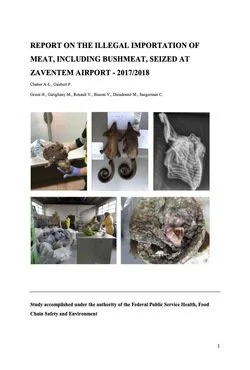By Anne-Lise Chaber, Philippe Gaubert, Claude Saegerman, Valéria Busoni, Mélodie Dieudonné, Harriet Green
The hunting for and consumption of bushmeat is traditional and vital for many communities around the world; it provides food and income as well as holding traditional value. Historically subsistence hunting was sustainable, however increased demand, improved access to forests and more efficient methods of hunting are resulting in unsustainable offtakes of wildlife. The growth in human population and ease with which people can move around the globe are causing an increase in demand, within range countries and internationally. Hunting unsustainably has the potential to cause a species to go extinct, locally or globally. The decrease or complete loss of a population has wider impacts on the ecosystem and so the people who depend on it. The international bushmeat trade is not fully understood and as such, it is unknown what impact this may be having on wildlife populations. This study aimed to gain a better understanding of the international bushmeat trade by estimating an average monthly weight of bushmeat being imported and determining which species are predominantly involved. Working with customs officers at Brussels airport, flights from Sub-Saharan Africa were targeted and all passengers’ luggage searched for both bushmeat and domestic meat (livestock). Visual identification, radiographs and genetic analysis were conducted to determine the species involved and any further information such as the age of the animal and hunting method used. Using the information of bushmeat seized and an estimate of the number of people entering Brussels from West and Central Africa each month, it was estimated that an average of 3.7 tonnes of bushmeat was being brought through Brussels airport each month. A range of species were identified, some of which were CITES listed. Some suggestions are made in order to reduce this importation by raising awareness on penalties and better enforcing those penalties. Besides, reinforcement of routine customs controls and more random schedules for specific actions of reinforced controls should be favoured by adequate budgets, allowing also a good, reiterated information and sensitization of custom’s officers. It would be justified that European budgets should be accorded for customs controls to Member States that are main and specific entry gates on the EU and its market. This would also allow the raising and presence of sniffling dogs to detect meat and other illegal products in passengers’ luggage, and the use of mini-technical devices to analyse DNA sequences on the spot.
Brussels: Federal Public Service Health, Food Chain Safety and Environment, 2018. 58p.


